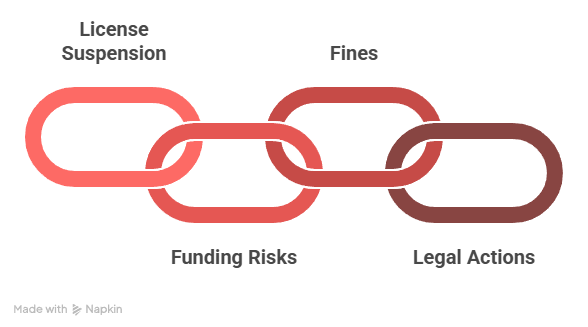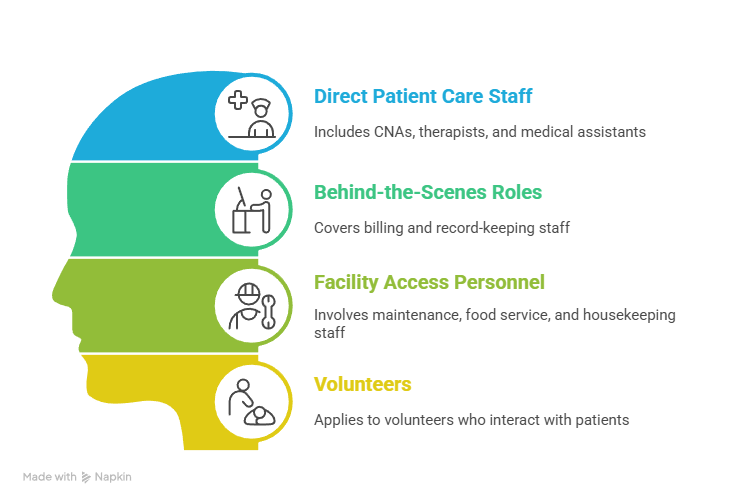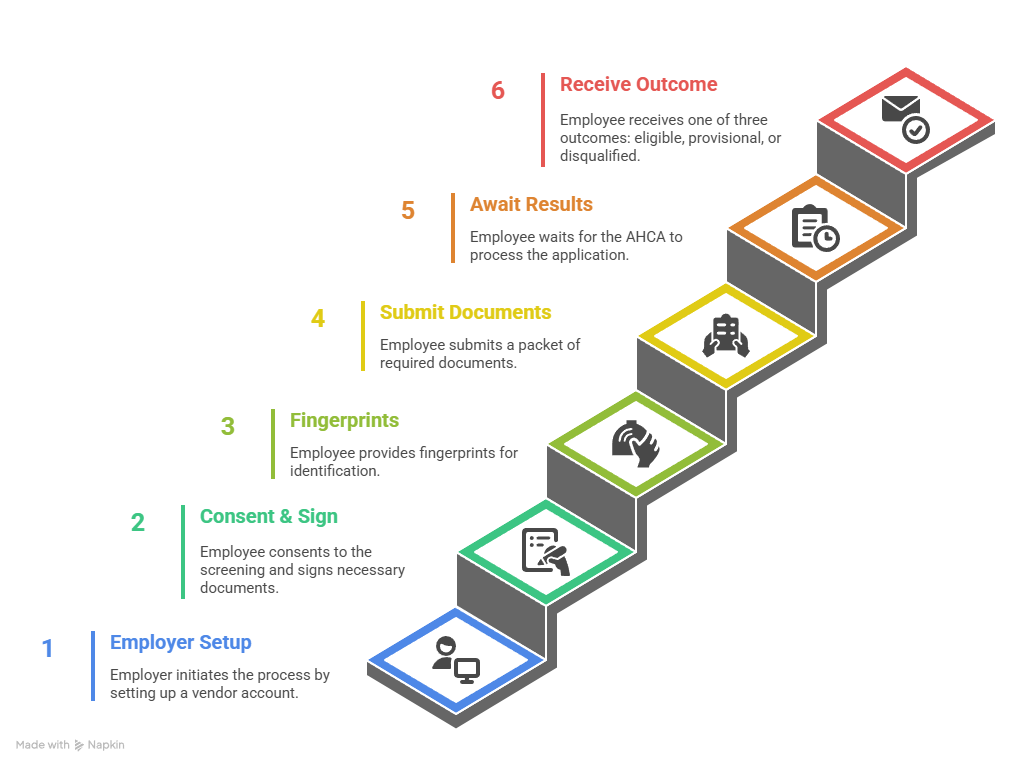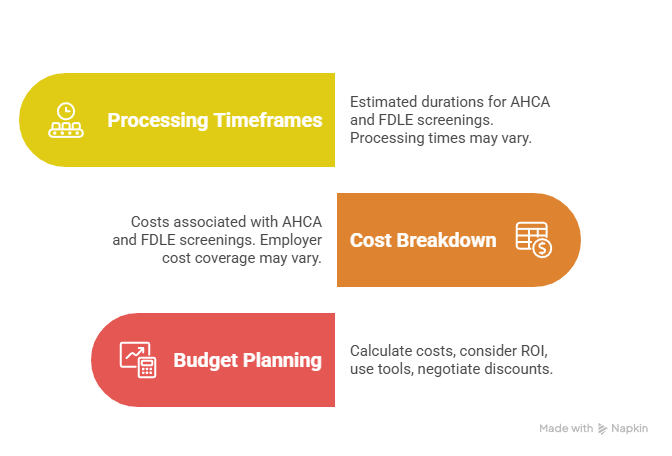Florida's healthcare background screening system involves multiple regulatory agencies working together to ensure patient safety through comprehensive checks. Understanding these requirements is crucial for both employers and job seekers to avoid costly compliance issues and maintain the integrity of healthcare services.
Key Takeaways
- Florida healthcare background checks require coordination between several regulatory agencies, including the Agency for Health Care Administration, Florida Department of Law Enforcement, and Department of Health.
- Comprehensive screening is essential for safeguarding patients and ensuring compliance with regulations, minimizing the risk of liabilities for healthcare providers.
- Penalties for disregarding background check requirements can include fines, license revocations, and loss of federal funding, emphasizing the importance of adherence.
- Level 2 background screening is mandatory for a wide range of roles in healthcare, including direct care, administrative, and even volunteer positions, ensuring a trusted environment for patient care.
- Both employers and job seekers should be proactive in understanding and navigating the legal frameworks and processes surrounding Florida healthcare background checks to avoid potential compliance issues.
Navigating the legal landscape of healthcare background checks in Florida involves a mix of state and federal regulations. Understanding these requirements can prevent costly compliance missteps.
Key Regulatory Bodies
- Agency for Health Care Administration (AHCA): This body oversees the licensing of healthcare facilities and mandates the AHCA Level 2 screenings. The screenings verify that healthcare professionals pass stringent safety criteria before they can serve patients. You can think of AHCA as the gatekeeper ensuring only qualified and safe individuals are part of the healthcare workforce.
- Florida Department of Law Enforcement (FDLE): Tasked with fingerprint processing and checking criminal histories, FDLE plays a critical role in screening. They ensure your fingerprints are accurately processed and any criminal records are thoroughly checked against state and federal databases. Their work supports a critical layer of trust and safety in healthcare settings.
- Department of Health (DOH): The DOH deals with the professional licensing of healthcare practitioners. Every nurse, doctor, or allied health professional needs to have the DOH’s stamp of approval indicating they meet the necessary professional and ethical standards to practice in Florida.
- Department of Children and Families (DCF): Although primarily focused on family services, the DCF imposes additional screenings particularly for roles involving the care of children and vulnerable populations. Their requirements can sometimes add layers to the screening process for specific healthcare jobs.
Each one plays a role in protecting patients and maintaining a safe, reliable environment for care. Are you familiar with how these bodies influence your day-to-day operations? Knowing their functions helps streamline compliance and ensures you stay on top of regulatory requirements.
EXPERT INSIGHT: In a field of healthcare, every hiring choice carries substantial consequence. We are not hiring for a mere office role; we are handing the responsibility of others' care, trust, and well-being. In turn, background verification goes beyond being a formality of procedure; it becomes a critical part of our responsibility of protecting both patients and the staff working for them. With ample funding being provided for this program, the achievement of the safer workplaces, more compatible teams, and a culture for the workplaces based on kindness and integrity will be realized. This program goes beyond compliance; essentially, it deals with the need of giving priority to the welfare of people. - Charm Paz, CHRP
Why Comprehensive Screening Is Mandatory
When it comes to healthcare, safety isn't just a priority—it's non-negotiable. Comprehensive background screenings protect patients, particularly those who are elderly or otherwise vulnerable. By ensuring that healthcare workers have clear records, you help secure the trust that patients place in your hands.
Your facilities must meet federal compliance standards set by the Center for Medicare and Medicaid Services (CMS). This layer of scrutiny keeps your institution eligible for federal aid, which can be crucial for operational sustainability. Additionally, stringent background checks mitigate liability risks, protecting your organization from legal headaches and financial losses.
Consider the impact of a single lapse in this process. A staff member with a concealed criminal background can lead to catastrophic reputational damage, costing far more than maintaining rigorous checks. Comprehensive screenings aren't just about ticking boxes; they're essential for the welfare of both patients and your healthcare facility. Would you want anything less for your community?
Penalties for Non-Compliance

Non-compliance with healthcare background screening requirements in Florida can lead to serious repercussions. Let's get straight to point—your facility’s license is at risk. The Agency for Health Care Administration (AHCA) has the authority to suspend or even revoke licenses for facilities that don't adhere to screening mandates. This can halt operations entirely.
Another consequence to consider is the potential loss of Medicare or Medicaid funding. These federal programs demand strict compliance with background check laws. Losing such funding could dramatically affect your financial stability.
Failing to comply also opens you up to civil penalties. Each infraction can cost up to $10,000. Imagine multiple fines stacking up—these could severely dent your financial resources.
Legal actions add to the burden. If regulators see your facility as deliberately non-compliant, prepare for possible lawsuits. The legal costs and time involved in defending against such cases can be draining.
In avoiding these penalties, ask yourself: Is skipping a step in the screening process worth the risk? The repercussions far outweigh the effort needed to comply. Protect your facility and your employees by sticking to the protocol.
AHCA Level 2 Background Screening Requirements
Who Must Complete Level 2 Screening

Everyone involved in patient care or who has access to patients or sensitive information needs Level 2 screening. This includes direct patient care staff such as Certified Nursing Assistants (CNAs), therapists, and medical assistants who are on the front lines of healthcare. They interact directly with patients and are expected to maintain the highest standards of safety and responsibility.
Employees who deal with patient records are also required to undergo this screening. This group includes billing staff and records clerks who handle confidential information that, if misused, could lead to breaches of privacy or fraud.
Non-medical personnel like maintenance workers, food service employees, and housekeeping staff who have access to the facilities are not exempt either. While they may not work directly with patients, their presence in the healthcare environment necessitates background checks to ensure a safe and secure space for everyone.
Even volunteer workers are subject to these screenings if they frequently interact with patients or spend time in the facilities. Volunteers play crucial roles in patient support and care, and it's vital they meet the same stringent standards to maintain trust and safety within healthcare settings.
Ensuring that these diverse groups meet screening requirements protects patients and upholds the integrity of the healthcare system. It raises the question—how do you ensure that every potential employee or volunteer meets these standards consistently? Managing a comprehensive screening process is not just a regulatory necessity; it is fundamental to maintaining a trustworthy healthcare environment.
Level 2 Screening Components
Level 2 screening is thorough, not just a quick peek into your past. You can expect a criminal history check spanning both state and federal databases. They'll run your information against the sex offender registry across multiple states, and also check the abuse registry for any records of elder or vulnerable adult abuse. Employment history is on the table too, especially your previous healthcare job records. They won’t skip checking your professional license for its active status and any past disciplinary actions. Every piece matters and contributes to a safer environment for patients.
AHCA Screening Process Steps

Start with employer registration. You'll need to create an account with an AHCA screening vendor, which is the first step to initiate the background check process. Once the account is set up, move to the next step: acquiring employee consent. It's vital to obtain written authorization from the employee and collect their fingerprints, as these are necessary for conducting thorough checks.
After consent, proceed to the screening submission phase. You'll submit the application along with all required documents, such as identification and previous employment details. This submission is crucial; ensure it's complete to avoid delays. Following submission, the review period begins. The processing time usually ranges from 5 to 10 business days, but it could vary based on the volume of applications.
When results come in, interpretation follows. The statuses you may encounter are eligible, provisional, or disqualified. Each status determines the next steps, so understanding them is essential. Eligible means the individual meets all necessary requirements. Provisional allows temporary employment under supervision while awaiting final results. Disqualified indicates that the candidate does not meet criteria, necessitating further action.
These steps are designed to be straightforward and systematic, ensuring that only qualified individuals enter the healthcare workforce. Have you set up efficient processes to handle these steps seamlessly within your organization?
Provisional Employment Rules
While waiting for your screening outcome, there's a possibility of provisional work for up to 90 days. But this isn't a free pass; you'll need direct supervision throughout this period. If any disqualifying results come back, employment stops immediately. This rule isn't to hamper you but to ensure the highest safety standards. Consistency and clarity in following these steps shield your organization from hefty penalties and bolster patient care quality.
FDLE Fingerprint Processing Requirements

FDLE Fingerprinting Overview
FDLE fingerprinting is mandatory for all individuals entering healthcare roles in Florida. This involves LiveScan electronic fingerprinting, which facilitates rapid and accurate processing. Typically, the state handles these records within 3-5 days, while the FBI may take up to 15 days to return results. It’s important to note that fingerprints are valid for 12 months, aligning with the need for periodic re-screening in the industry.
Where to Complete FDLE Fingerprinting
You can complete your fingerprinting at authorized LiveScan locations. These include sheriff's offices and approved private vendors throughout Florida. Be prepared with your valid identification and screening authorization at your appointment. The total fee, covering both Florida and FBI checks, amounts to $41.25. Remember, appointments are usually required, so plan ahead to avoid delays.
FDLE Record Types and Scope
When you undergo FDLE fingerprinting in Florida, the process generates several types of records. Knowing what these records entail can help you anticipate their impact.
| Record Type | Description |
|---|---|
| Florida Criminal History | This record encompasses all legal matters within the state. It includes arrests, charges, and convictions that have occurred in Florida, providing a comprehensive view of your interactions with the state's criminal justice system. |
| Federal FBI Records | These records extend beyond Florida, covering any interstate or federal issues. If you've had encounters with law enforcement outside the state, this is where they'll be cataloged. This aspect of your record can play a significant role if your employment requires nationwide verification. |
| Sealed and Expunged Records | Although typically off-limits, these records may still surface during healthcare screenings. Florida law permits certain convictions to be sealed or expunged, restricting general access. However, in healthcare scenarios, these records might be disclosed to ensure comprehensive background checks, ensuring patient safety. |
| Pending Cases | It's crucial to remember that any unresolved legal matters will appear on your record. Open charges, even if not yet resulting in conviction, can influence hiring decisions. Employers might view pending cases as potential risks, making it critical for you to address these proactively, if possible. |
Understanding these record types aids in preparing for employment background checks. It helps identify areas that may require personal attention or legal advice to improve your employment prospects. Stay informed about your record status and keep documentation ready to address any issues efficiently.
Common FDLE Processing Issues
Several factors can snag FDLE processing. Poor fingerprint quality often mandates resubmission to obtain clear results. Name discrepancies, whether due to changes or aliases, can also cause complications. Out-of-state records generally prolong processing times, as accessing these databases takes longer. Lastly, technical system delays, especially during peak periods, might slow everything down. It’s worth preparing and scheduling in advance to sidestep these roadblocks.
Healthcare-Specific Disqualifying Factors
Automatic Disqualifiers (No Exceptions)
When it comes to Florida healthcare background checks, certain offenses will halt your employment path before it starts. These disqualifying factors are non-negotiable, reflecting the serious responsibility healthcare workers hold.
Violent Crimes: Any conviction for murder, manslaughter, or kidnapping means you're ineligible. These crimes indicate a potential threat to patient safety, which facilities cannot risk.
Exploitation of Vulnerable Adults: If you've been involved in the abuse or exploitation of an elder or disabled adult, you're barred. Patients depend on caregivers, and any history of mistreatment disqualifies you from assuming a caregiving role.
Healthcare-Related Crimes: Offenses like patient abuse or healthcare fraud are disqualifiers. Trust is a non-negotiable currency in healthcare; any breach of that trust through criminal activity is a red line.
Sexual Offenses: Registration on a sex offender list automatically disqualifies you. The nature of healthcare work often involves vulnerable individuals, and safeguarding their well-being is paramount.
These automatic disqualifiers reflect zero tolerance for behaviors that could endanger patients or the integrity of healthcare facilities. If you find yourself among those impacted, it's crucial to consider alternative career paths where your past doesn't preclude you from contributing positively. Have you considered positions or industries outside direct healthcare services?
Case-by-Case Evaluation Factors
Some offenses are evaluated on an individual basis. Property crimes, for instance, are reviewed with the context in mind—not all result in disqualification. Drug-related offenses might be reconsidered if there's evidence of rehabilitation. The time since a conviction is also considered, with some convictions older than 15 years being potentially overlooked. Isolated offenses might be treated more leniently compared to repeated violations, where a pattern of behavior becomes evident.
Professional License Disciplinary Actions
When it comes to professional licenses, healthcare workers face strict scrutiny. Any actions against a nursing or medical license can impact employment eligibility. Temporary suspensions, even for administrative oversights, must be disclosed. Employers look beyond the surface, examining the reasons for any disciplinary actions. For instance, a nurse who had their license suspended due to a lapse in continuing education can still regain employment after rectifying the issue and demonstrating compliance.
Allied health professionals also face similar evaluations. A violation of the scope of practice, such as a medical assistant administering medications without proper authorization, may result in disciplinary measures. Such actions can trigger a more rigorous background check.
Multi-state licenses add another layer. The Nurse Licensure Compact allows nurses to work across state lines, but violations in one state can follow professionals to another. Employers conducting checks might discover compact violations, which could be a dealbreaker. It's vital for healthcare workers to maintain good standing in all states where they're licensed.
Understanding disciplinary impacts helps both employers and job seekers. Employers ensure safe environments by checking these records. Job seekers must be transparent about past issues and proactive in addressing them. This transparency can lead to positive outcomes, even after past missteps.
Employer Compliance Guide
For Healthcare Employers
Develop a robust screening policy in line with state requirements. Your policy should outline every step of the screening process, from initial application through to final hiring decisions. Select screening vendors approved by the AHCA. Ensure these vendors meet both state and federal criteria. Accurate documentation is critical. Keep detailed records of all background checks, including consent forms and results, to safeguard against potential audits or disputes. If you manage multiple facilities, standardize your processes across all locations to streamline operations and maintain consistency.
For HR Managers
Implement a pre-employment screening workflow that aligns with hiring processes. Structure job offers to accommodate the time needed for screenings. Consider making job offers conditional upon the results of these checks. Regularly re-screen your employees, preferably on an annual basis, to mitigate risk and ensure continued compliance. Address any disputed results promptly and thoroughly to maintain trust with candidates and minimize legal risks.
Staff Training and Communication
Educate hiring managers about compliance timelines to prevent delays. Clear communication with candidates about the screening process and expectations sets the tone for transparency. Ensure adherence to the Fair Credit Reporting Act (FCRA) to protect both the organization and the prospective employees. Retain records according to state guidelines to avoid issues with incomplete documentation. Keeping all staff informed and versed in these procedures is essential for operational smoothness and legal compliance.
Job Seeker Navigation Guide

Preparing for Healthcare Background Screening
Clear preparation can smooth out the healthcare background check process. Start by gathering all necessary documents early. Have copies of your identification, educational certificates, and professional licenses ready. This foresight can prevent delays and ensure a straightforward experience.
Being aware of your criminal history is also crucial. You might consider obtaining a personal background check. This step allows you to address any errors or surprises before employers see them. It helps to understand your history and be prepared to explain any red flags honestly and completely.
Professional references are another key aspect. Choose references who can vouch for your work ethic and character. Supervisors and long-time colleagues are ideal, as they can provide valuable insights into your professional behavior.
Lastly, have a strategy for disclosure. If there are aspects of your history that might be concerning, be upfront. Transparency fosters trust with potential employers and can mitigate concerns about your past. How do you plan to present yourself when addressing any areas that might be questioned? Being prepared can make all the difference.
Understanding Your Rights
Navigating the background screening process requires a clear understanding of your rights. The Fair Credit Reporting Act (FCRA) gives you specific protections during this phase. If information in your background check could affect your job opportunity, employers must provide a pre-adverse action notice. This gives you a chance to review the report and dispute any inaccuracies before a final decision is made.
Florida privacy laws offer additional safeguards. You have the right to access your screening results. If you discover errors, there's a process to appeal and correct these records. Engage with the screening company immediately if discrepancies arise. Employers generally have protocols for handling such disputes, so don't hesitate to use those channels.
Discrimination based on background checks can be a concern. Federal and state standards govern what information can influence employment decisions. Employers must make sure they're considering only relevant data and not unfairly excluding candidates based on unrelated past issues.
Understanding these rights helps you navigate the screening process more confidently. It's crucial to be proactive in checking your records, addressing inaccuracies, and communicating with potential employers about any findings. This approach can make the difference in securing a position in healthcare roles that are subject to rigorous screening.
Career Planning with Background Issues
Not every employer is rigid about past mistakes. Seek out organizations known for giving second chances. Some employers value rehabilitation and personal growth.
Consider roles that might have different background requirements. If direct patient care positions pose a challenge, explore administrative roles or non-clinical positions in healthcare.
Keeping evidence of your rehabilitation efforts can help. Certificates from courses, letters from mentors, or proof of community service can demonstrate personal development.
Explore legal remedies if necessary. Expungement of certain offenses can sometimes be an option, securing a cleaner background for future checks. Consider consulting legal professionals to understand your options.
Cost and Timeline Management

Typical Processing Timeframes
Managing expectations around processing times is crucial. For AHCA Level 2 screenings, you usually see completion within 5 to 10 days. This is under normal conditions, assuming all documentation is in order and there are no technical glitches. FDLE fingerprint processing ranges from 3 to 15 days. This depends on the workload at the time of submission. High volumes of requests can introduce delays.
Rush processing isn't widely available. You're better off submitting your documentation early. Anticipate delays during busy seasons, like graduation months when new healthcare workers enter the field. Planning ahead can save you from last-minute frustrations.
Cost Breakdown by Screening Type
When planning for background checks, costs can vary. Understanding the typical expenses for each type helps you budget effectively. AHCA Level 2 screenings range from $35 to $65. These screenings are mandatory for healthcare roles and involve thorough checks to ensure compliance with safety standards.
FDLE fingerprinting is another requirement. The total cost for Florida and FBI checks is $41.25. This fee covers the processing of electronic fingerprints, which are crucial for criminal history verification.
You might need additional checks such as verifications for abuse registries or professional licenses. These extras can incur further charges. It's essential to account for these when estimating total costs. Employers have different policies regarding payment distribution. Some cover all expenses, while others might require job seekers to pay part or all of the screening costs. Understanding your organization's approach can help you manage expectations and prepare accordingly.
Budget Planning for Healthcare Employers
Managing screening costs is essential for healthcare employers aiming for compliance without financial strain. Evaluate your annual screening expenses on a per-employee basis. This assessment will help you anticipate total costs and allocate budgets effectively. For example, consider the $35–$65 range for AHCA Level 2 screenings and the $41.25 fee for FDLE fingerprinting.
A balanced cost-benefit analysis is crucial. Compliance costs can be substantial, but they safeguard you from fines and legal actions. Think of screening as an investment in risk management rather than a mere expense.
Incorporate technology to streamline the process. Automated tools can reduce manual labor, speed up screening, and lower errors, ultimately saving time and money. Negotiate volume discounts with vendors if your organization handles a high number of screenings annually. These savings can add up and ease budgeting concerns.
Planning ahead and using these strategies can ensure compliance without breaking the bank. Keeping costs predictable allows you to focus on hiring quality staff who meet regulatory requirements.
Common Challenges and Solutions
Processing Delays and Bottlenecks
Timing issues can disrupt hiring schedules significantly. Peak hiring seasons, such as after graduation or during holiday periods, can overwhelm screening systems. To manage these periods, consider staggering application submissions and prioritizing critical roles.
System outages pose another challenge. Prepare backup workflows, including manual documentation procedures, to maintain momentum. Keep communication open with applicants to update them on unforeseen delays.
Incomplete applications are a common problem. Double-check each submission for missing details or errors. Train staff on the requirements, and use checklists to reduce mistakes. An error-free application moves faster through the system.
Handling appeals and disputes requires tact and efficiency. Form clear guidelines for addressing contested results. Ensure applicants know their rights to appeal and provide them with resources for corrections. A transparent process eases concerns and maintains trust.
Regulatory Updates and Changes
Keeping up with regulatory updates can be challenging, but it's necessary for compliance. Legislation changes frequently, impacting everything from screening requirements to compliance deadlines. For instance, periodic updates from AHCA or FDLE might introduce new criteria or redefine acceptable practices. To manage this, it’s vital to have systems in place for monitoring announcements from key regulatory bodies. Subscribe to alerts or newsletters from AHCA and FDLE to stay informed about any new legislation or policy shifts.
Consider regularly training your staff on these changes. Develop a routine review process for updating internal protocols, ensuring your policies align with current regulations. Implement an internal task force or appoint compliance champions who can spearhead this initiative.
Technology plays a crucial role in adapting to regulatory changes. Investing in compliance management software can simplify the tracking of policy updates and automate the dissemination of new requirements across your organization. It speeds up the integration of changes, reducing human error and ensuring everyone is on the same page.
By staying ahead of regulatory changes, you maintain compliance, protect your facility from penalties, and ensure your hiring process remains smooth. Are your current systems robust enough to handle these shifts? Keeping a close eye on legislative updates is a proactive step in safeguarding your operations.
Future trends in Florida healthcare background screening are on the cusp of significant changes. Florida's legislative environment is eyeing modifications that could reshape the criteria and processes involved in AHCA Level 2 and FDLE fingerprint requirements. Potential updates to healthcare regulations could address gaps in current protocols and emphasize enhanced security measures. Keeping an ear to the ground is vital for employers to sidestep compliance pitfalls.
Conclusion
Success in adhering to Florida's healthcare screening requirements hinges on a clear understanding of AHCA Level 2 and FDLE fingerprinting rules. For employers, this means implementing comprehensive screening policies and choosing the right vendors. Job seekers, on the other hand, should prepare their documentation thoroughly and be upfront about any potential background issues. Staying proactive and informed reduces the risk of non-compliance and penalties. In this complex and regulated environment, strategic navigation is essential to ensure both compliance and continuity of care.
Frequently Asked Questions
The procedure for running a background check can seem intimidating, not least because of the many rules involved with working in a medical facility. Companies that are serious about compliance, not to mention applicants curious about the standards that apply, share a common concern. This FAQs list brings together the most common questions in a handy format, enabling others to focus on the bottom line: that of preserving the integrity of the procedure.
What level of background check is required for Florida health care?
A Level 2 background check is required for most Florida healthcare positions. This Florida healthcare background check includes fingerprinting and an extensive search of criminal records to ensure patient safety and regulatory compliance.
How does Florida do background checks?
Florida conducts background checks through the Florida Department of Law Enforcement (FDLE) using fingerprinting and cross-referencing state and national databases.
What is level 2 background screening with the FL Department of Health?
Level 2 background screening involves a fingerprint-based check for disqualifying offenses. It covers both state and federal criminal histories.
How far do they go back on a background check in Florida?
Background checks in Florida typically cover a person's entire criminal history but focus primarily on the last seven years.
What disqualifies you from a level 1 background check in Florida?
Certain offenses, such as felonies involving violence or dishonesty, can disqualify you. Each employer may have specific criteria.
What fails a level 2 background check in Florida?
Disqualifying offenses for a Level 2 check include convictions for serious crimes, such as certain violent or sexual offenses.
What is required in Florida employee healthcare?
Employees must often submit to a Level 2 background check and meet specific job qualifications, including education and experience.
What are the disqualifying offenses for AHCA background screening in Florida?
Disqualifying offenses include certain violent crimes, fraud, and drug-related offenses. The Agency for Health Care Administration (AHCA) outlines these in detail.
How long does a level 1 background check take in Florida?
A Level 1 background check typically takes a few days but can vary depending on the employer's process.
What is Florida screening compliance?
Florida screening compliance ensures that healthcare employees undergo the required Florida healthcare background check to protect patients and improve safety. This compliance process verifies that healthcare workers meet state requirements through proper background screenings before they can work in healthcare facilities.
How much is a level 2 background check in Florida?
The cost for a Level 2 background check can range from $50 to $100, depending on the provider and required processing.
What types of jobs require a Level 2 background check in Florida?
Jobs involving vulnerable populations, such as those in healthcare or childcare, typically require a Level 2 background check.
How do you schedule a fingerprinting appointment in Florida?
You can schedule an appointment through an approved vendor like LiveScan, which offers locations throughout Florida.
Can you dispute the findings of a background check in Florida?
Yes, you can dispute findings if you believe there are errors. Contact the agency that conducted the check for instructions.
Are background checks required for volunteers in Florida healthcare facilities?
Yes, volunteers in healthcare facilities often need background checks to ensure patient safety and compliance with regulations.
Additional Resources
- Background Screening Requirements – Florida Department of Health
https://flhealthsource.gov/background-screening/bgs-requirements/ - “Cleared to Care” Marketing Campaign Launches to Inform Health Care Practitioners of New Background Screening Requirements
https://floridasmentalhealthprofessions.gov/cleared-to-care-marketing-campaign-launches-to-inform-health-care-practitioners-of-new-background-screening-requirements/ - HB 975’s New Background Screening Requirement – Florida Board of Nursing
https://floridasnursing.gov/hb-975s-new-background-screening-requirement/ - Florida Expands Background Checks for Healthcare Workers – Verified Credentials News
https://news.verifiedcredentials.com/florida-healthcare-background-check-expansion-law - New Background Screening Requirement for Florida Licensees – Effective July 1 – Primary Source Verification
https://pscfl.org/news/702881/New-Background-Screening-Requirement-for-Florida-Licensees--Effective-July-1-.htm

GCheck Editorial Team
Meet the GCheck Editorial Team, your trusted source for insightful and up-to-date information in the world of employment background checks. Committed to delivering the latest trends, best practices, and industry insights, our team is dedicated to keeping you informed.
With a passion for ensuring accuracy, compliance, and efficiency in background screening, we are your go-to experts in the field. Stay tuned for our comprehensive articles, guides, and analysis, designed to empower businesses and individuals with the knowledge they need to make informed decisions.
At GCheck, we're here to guide you through the complexities of background checks, every step of the way.






